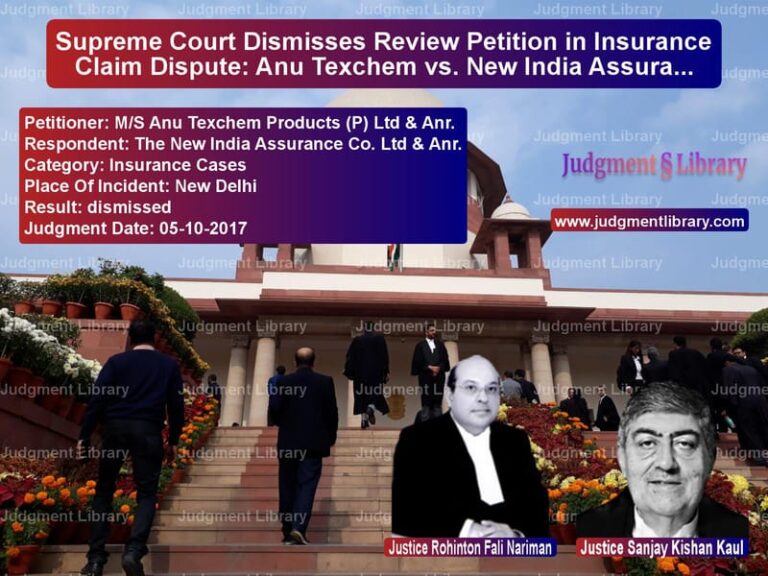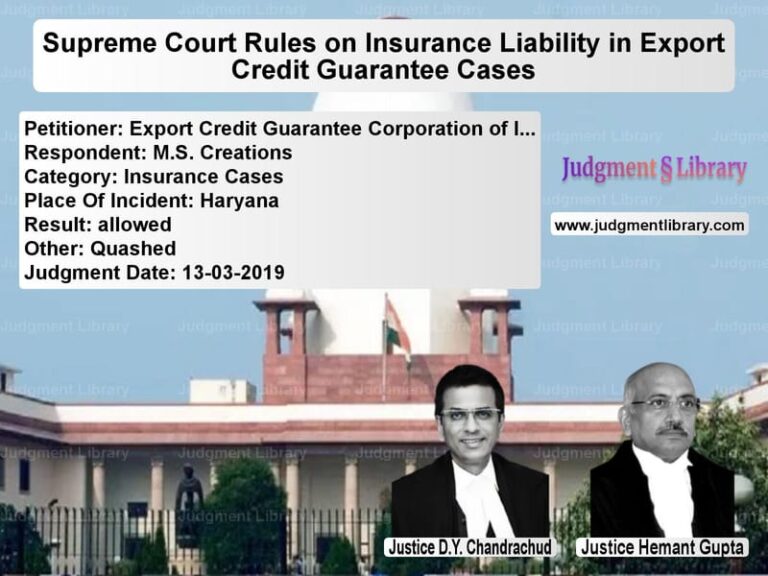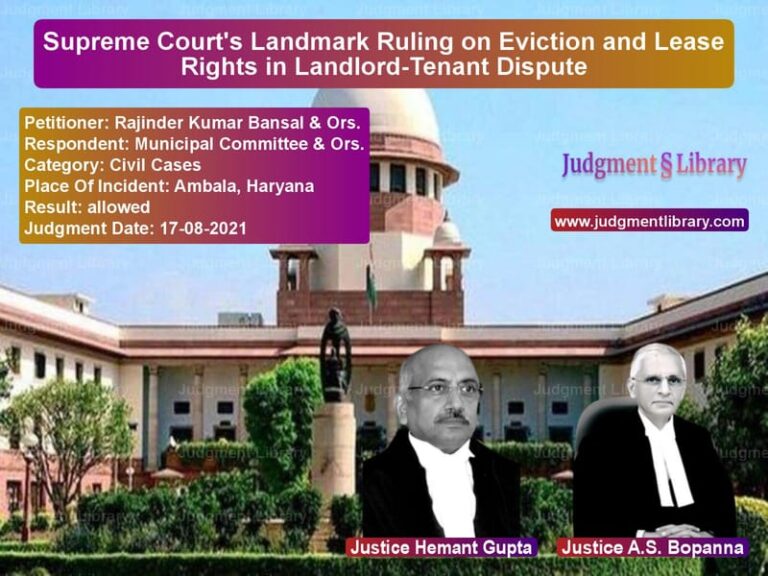Supreme Court Reduces Murder Conviction to Culpable Homicide: A Case of Heat of Passion
The case of Jugut Ram vs. The State of Chhattisgarh revolves around a dispute that led to a fatal altercation over land possession. The Supreme Court examined whether the accused’s actions constituted murder under Section 302 of the Indian Penal Code (IPC) or if the offense fell under Section 304 Part II IPC, considering that the incident occurred in the heat of the moment without premeditation.
The appellant, Jugut Ram, was convicted by the lower courts under Section 302 IPC and sentenced to life imprisonment. However, the Supreme Court, after analyzing the facts, reduced the conviction to culpable homicide not amounting to murder under Section 304 Part II IPC and ordered his release as he had already served the maximum sentence prescribed under this section.
Background of the Case
The incident took place on November 23, 2001, around 2:00 PM, when a dispute over land ownership escalated into a physical altercation. The deceased was harvesting crops when the appellant attacked him with a lathi (wooden stick), hitting him on the head. The victim succumbed to his injuries the next day at the hospital.
The prosecution presented eyewitness accounts, medical reports, and forensic evidence to establish the appellant’s role in the assault. The trial court and the High Court both upheld the conviction under Section 302 IPC, sentencing the appellant to life imprisonment.
Petitioner’s Arguments
The appellant’s counsel, Ms. Nanita Sharma, argued:
- All four witnesses were related to the deceased, making their testimonies potentially biased.
- No independent witnesses were examined.
- The serological report did not conclusively establish that the blood on the weapon matched the deceased’s blood group.
- The deceased did not die immediately; he succumbed to his injuries a day later, indicating that the injuries were not inflicted with an intention to cause death.
- The appellant also suffered injuries during the incident, which indicated that it was not a one-sided attack.
- The altercation occurred in the heat of the moment due to an ongoing land dispute, without premeditation.
Respondent’s Arguments
The prosecution, represented by Sri Sourav Roy, countered:
- The deceased was in lawful possession of the disputed land, and the appellant was the aggressor.
- The appellant struck the deceased on the head, a vital part of the body, demonstrating intent to cause fatal injury.
- Eyewitness testimonies consistently placed the appellant at the scene as the assailant.
- The injury inflicted was severe and directly caused the victim’s death.
Supreme Court’s Key Observations
The Supreme Court carefully analyzed the evidence and made the following key observations:
“The assault was not premeditated but had taken place in a heat of passion due to a land dispute. If the appellant had the intention, nothing prevented him from further assaulting the deceased.”
The Court further noted:
- A lathi is a common object used by villagers and is not necessarily a weapon of assault.
- The number and nature of injuries, along with the manner of attack, suggested that the appellant did not intend to kill the victim but acted in the heat of the moment.
- Injuries inflicted on the appellant also indicated that there was a struggle, making it unlikely that the attack was preplanned.
Application of Legal Precedents
The Court referred to multiple precedents to support its decision:
- Joseph vs. State of Kerala (1995 SCC (Crl.) 165): The accused struck the victim twice on the head with a lathi. The Court held that the act did not constitute murder as there was no intention to kill.
- Chamru Budhwa vs. State of Madhya Pradesh (AIR 1954 SC 652): A single blow on the head led to the victim’s death. The Supreme Court ruled it as culpable homicide, not murder.
- Gurmukh Singh vs. State of Haryana (2009) 15 SCC 635: A head injury caused by a lathi led to death. The conviction was altered from murder to culpable homicide.
- Mohd. Shakeel vs. State of Andhra Pradesh (2007) 3 SCC 119: The accused inflicted a single fatal injury and also suffered injuries, leading to a reduced conviction.
Final Judgment
The Supreme Court modified the conviction and ruled:
“We accordingly alter the conviction of the appellant from Section 302 IPC to Section 304 Part II, IPC. The appellant is in custody since 2004. He has already undergone the maximum period of sentence prescribed under the same. The appellant is, therefore, directed to be set at liberty forthwith unless wanted in any other case.”
Implications of the Judgment
This ruling has significant implications for criminal jurisprudence in India:
- It reinforces the principle that not all fatal attacks qualify as murder; intent and circumstances must be considered.
- It emphasizes the importance of evaluating whether an attack was premeditated or committed in the heat of passion.
- It highlights that use of common objects like a lathi does not automatically indicate intent to murder.
- It provides clarity on sentencing, ensuring proportional punishment based on the nature of the crime.
With this verdict, the Supreme Court reaffirmed the distinction between murder and culpable homicide and ensured that justice was served by imposing a punishment proportionate to the crime.
Petitioner Name: Jugut Ram.Respondent Name: The State of Chhattisgarh.Judgment By: Justice R.F. Nariman, Justice Navin Sinha, Justice Indira Banerjee.Place Of Incident: Chhattisgarh.Judgment Date: 16-09-2020.
Don’t miss out on the full details! Download the complete judgment in PDF format below and gain valuable insights instantly!
Download Judgment: Jugut Ram vs The State of Chhatti Supreme Court of India Judgment Dated 16-09-2020.pdf
Direct Downlaod Judgment: Direct downlaod this Judgment
See all petitions in Murder Cases
See all petitions in Attempt to Murder Cases
See all petitions in Judgment by Rohinton Fali Nariman
See all petitions in Judgment by Navin Sinha
See all petitions in Judgment by Indira Banerjee
See all petitions in partially allowed
See all petitions in Modified
See all petitions in supreme court of India judgments September 2020
See all petitions in 2020 judgments
See all posts in Criminal Cases Category
See all allowed petitions in Criminal Cases Category
See all Dismissed petitions in Criminal Cases Category
See all partially allowed petitions in Criminal Cases Category







